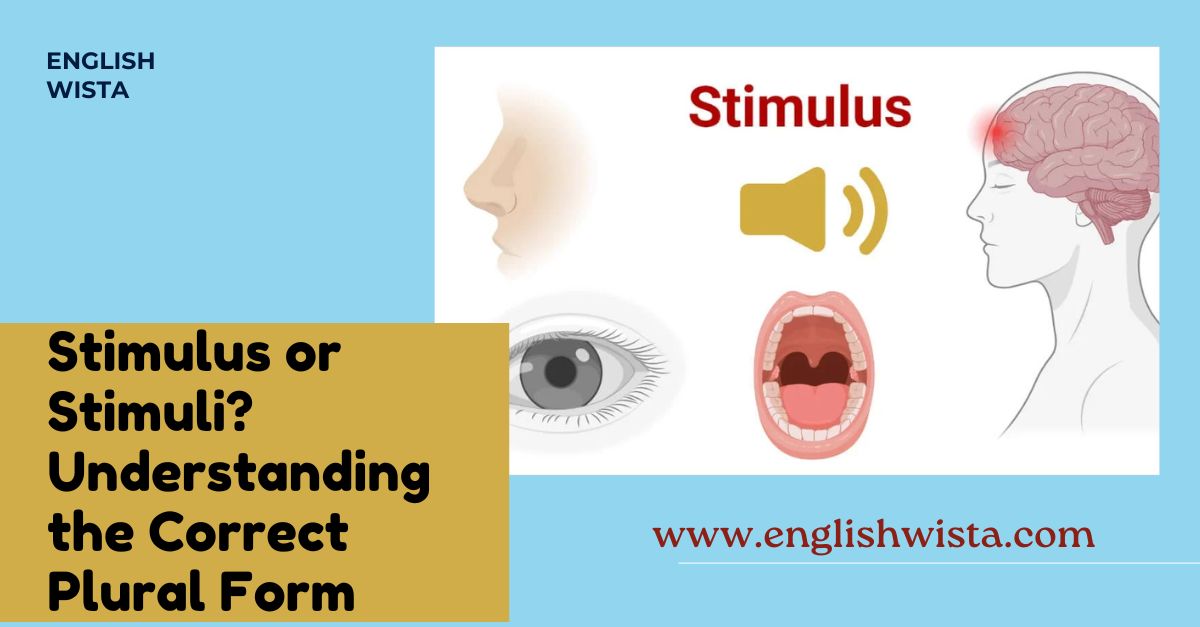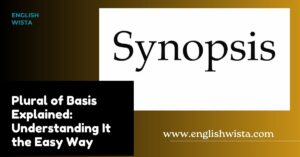Have you ever come across the word stimulus and wondered how to make it plural? You’re not alone! Words that come from Latin, like stimulus, often confuse people because they don’t follow the simple “just add -s” rule. The plural of stimulus is not stimuluses (although you’ll hear that sometimes in casual use). Instead, the correct plural is stimuli.
But don’t worry if that feels tricky right now. In this article, we’ll break it down step by step. We’ll explore what the word stimulus means, how to form its plural, why it looks different from regular plurals, and how you can use it confidently in everyday conversations or writing. Along the way, we’ll sprinkle in examples, fun facts, and comparisons to other words so you’ll never forget this one again.
Let’s take a closer look!
What Does Stimulus Mean?
Before we talk about plurals, it’s helpful to understand the meaning of the word.
A stimulus is something that causes a reaction or response. In simple terms, it’s anything that makes you or another living thing respond in some way.
For example:
- A bright light can be a stimulus for your eyes.
- A sudden loud noise can be a stimulus that makes you jump.
- A funny joke can be a stimulus for laughter.
So, a stimulus is basically a trigger. It sparks a change, reaction, or movement.
What Is the Plural of Stimulus?
Now comes the main question: What is the plural of stimulus?
The answer is: stimuli.
Why not stimuluses? Because stimulus comes from Latin, and many Latin-based words in English keep their original plural forms. In Latin, words ending in -us often change to -i in the plural.
Here are a few similar examples:
- alumnus → alumni
- fungus → fungi
- cactus → cacti
So, just like those words, stimulus becomes stimuli when there’s more than one.
How to Pronounce Stimuli
Sometimes people hesitate to use this word because they’re not sure how to pronounce it.
- Stimulus is pronounced STIM-yuh-luhs.
- Stimuli is pronounced STIM-yuh-lie.
Think of it like this: stimuli rhymes with “butterfly.”
Is Stimulus Singular or Plural?
This is a very common question. Let’s make it crystal clear:
- Stimulus is singular. Use it when talking about one thing.
- Stimuli is plural. Use it when talking about more than one.
Examples:
- The teacher used a loud clap as a stimulus to get the class’s attention.
- Several stimuli in the environment, like noise and heat, made the experiment difficult.
Can You Say Stimuluses?
Technically, some English speakers do use stimuluses, and you may even see it in very casual writing. But in formal English (like academic, professional, or educational contexts), stimuli is the correct plural.
So, if you want to sound polished and accurate, always go with stimuli.
Real-Life Examples of Stimulus and Stimuli
Let’s make this even clearer with some everyday examples.
Singular (stimulus):
- Music can be a powerful stimulus for creativity.
- The smell of food was a strong stimulus for his hunger.
- A gentle tap on the shoulder acted as a stimulus to wake him up.
Plural (stimuli):
- The baby reacted to different stimuli, such as sound and light.
- Scientists tested various stimuli to study animal behavior.
- Economic stimuli helped boost the country’s growth.
See how simple it becomes when you practice?
Where Do We Use the Word Stimulus?
You’ll find this word used in different areas of life. Here are a few common fields where stimulus and stimuli appear:
- Biology and Psychology
- In science, a stimulus is anything that causes an organism to respond.
- Example: Touching something hot is a stimulus that makes you pull your hand away.
- Economics
- In economics, a stimulus can mean something that boosts growth or activity.
- Example: The government introduced a financial stimulus to support businesses.
- Education
- Teachers often use stimuli (plural) to engage students, like pictures, sounds, or games.
So, the word isn’t just about biology it has a wide range of uses.
Why Is the Plural Stimuli and Not Stimuluses?
This all goes back to Latin. English has borrowed many words from Latin, and for some of them, we still use the original plural endings.
In Latin:
- Words ending in -us often become -i.
- That’s why stimulus → stimuli.
Other examples help reinforce this pattern:
- nucleus → nuclei
- radius → radii
- syllabus → syllabi (though syllabuses is also common today)
So, if you see a word that ends in -us, it might follow this rule.
Fun Facts About Stimulus
Here are some little extras to make learning fun:
- Latin Roots: The word stimulus originally meant a “goad” or a sharp stick used to urge animals forward. So, it literally meant something that prods into action just like it does in English today.
- Modern Usage: In economics and politics, you’ll often hear about “stimulus packages,” which are plans to encourage spending or growth.
- Everyday Language: Even outside of science, people use stimulus to mean anything that sparks activity, like “Exercise is a stimulus for good health.”
Common Mistakes to Avoid
When learning this word, people often make a few mistakes. Let’s clear them up:
- Saying stimuluses instead of stimuli.
- Forgetting that stimulus is singular.
- Mixing up pronunciation (remember: stimuli rhymes with “butterfly”).
Keep these in mind, and you’ll sound confident.
Quick Recap with Examples
Here’s a short recap to reinforce what we’ve learned:
- Stimulus = one thing that causes a reaction.
- Example: A funny video can be a stimulus for laughter.
- Stimuli = more than one stimulus.
- Example: The brain processes many stimuli at once, like sound, touch, and sight.
Simple, right?
Tips to Remember the Plural
If you want a memory trick, here’s one:
- Think of stimulus as a “singular stick” that pokes you.
- Think of stimuli as “many sticks” poking from different directions.
That picture in your mind makes it easier to recall!
Conclusion
So, what’s the big takeaway? The plural of stimulus is stimuli, not stimuluses. A stimulus is a trigger or cause for a reaction, and when you have more than one, they’re called stimuli.
We’ve looked at what the word means, where it comes from, how to pronounce it, and how to use it correctly in sentences. We’ve also seen examples from biology, economics, education, and everyday life.
Next time you come across this word, you won’t hesitate. You’ll know exactly whether to use stimulus or stimuli. And if you want to impress someone with a fun fact, you can tell them that the word originally meant a sharp stick in Latin!
Language can sometimes feel like a puzzle, but once you unlock little pieces like this, it all starts to make sense. So go ahead use stimuli confidently in your conversations and writing.



